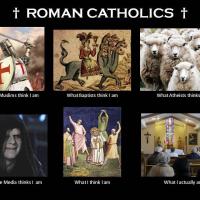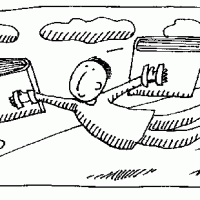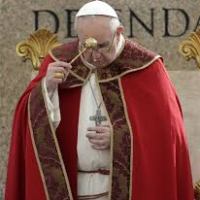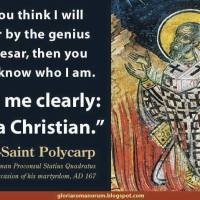The Salmon’s Badge of Honour goes to Fr. Peter Edwards…
…for being a wonderful teacher and leader in Faith, for remaining faithful to the teaching of the Magistarium. Thank you for your gentle but forthright homily on the Feast of the Holy Family; for presenting the Truth of the Catholic Faith regarding to the dignity of each and every one of us in Jesus, and for reminding all that we are all come to be Royalty through our Saviour. Thank you for reminding us about the importance of the family. Thank you for having the courage of your convictions to ‘go against the grain’ regardless of the ever-present criticism or dissent. The Salmon stands with you proudly!
Having posted the Super-Slogan yesterday, imagine my delight when opening heroic posts defending the dignity of marriage and family with sincerity, passion and conviction. Fr. Ray ‘s post,‘ LET’S FORGET THE NICENESS, LET’S BE CATHOLIC,’ resounded with me as I feel strongly that Catholics on these shores need to stand together in solidarity to share the TRUTH of our Faith, for the sake of society as we know it.
I quote Fr. Ray’s excellent suggestions that could be put forward in a Catholic Pro-family Manifesto:-
Rather than being embarrassed by it we should dare to talk about what the Church understands by being “human”, which involves human sexuality.It is radical, we should accept that it is counter-cultural, it overthrows the politics of left and right by simply saying the family is the most important element in society not wealth creation or even self determination and self-fulfilment.
We could start by trying to get people to discuss marriage, how about large banners on every Catholic building saying something like “Marriage = Man + Woman: discuss” We could spend money on a poster campaign. We should have done it ages ago but what about every diocese in the country producing study material on Humanae Vitae and Evangelium Vitae?
Is it too late to organise symposia in amongst orthodox Christian academics on Marriage?In the capital at the very least we should be organising public meetings to talk about marriage, and demonstrations to show what we mean by marriage.
In the institutions we still control, our schools most especially, we should be promoting the family. The state, for the last century or two, has been promoting the view that we are here primarily to serve the economy, and that we have value and status in our production of wealth ultimately in our family relationships but as Catholics we should be educating people to understand we have value in our relationships with one another. Just as the state promotes Sports or Performing Arts Academies we Catholics should be making every school or college an Academy for the Family.
With epidemic marital breakdown we need to teach people how to be married, especially boys, for too long Catholics have done so very little to really educate our young for either eternal or marital life. We should recognise most women have abortions because of economic reasons, that controlling the size of families through contraception for most people is an economic decision.
We need to promote an authentic feminism (and masculinism) that is based on relationships, we need to promote the real rights of women to be parents, simply to be able to have children without the constant anxiety to find childcare and to be able to afford it.We need to promote affordable family housing.
We need promote Sunday, the Lord’s Day, a day of re-creation, as a day for building family. Every Catholic social justice organisation should be deeply involved in promoting an economic model that sees the family, rather than the creation of personal wealth, as priority.
In a further post Fr. Ray draws our attention to the efforts of the newly appointed Archbishop Philip Egan of Portsmouth’s Pastoral letter, (published here) which was read out on the feast of the Holy Family:
JESUS CHRIST, THE PERFECT HUMAN
Dear Brothers and Sisters in Christ,In this second Pastoral Letter, I want to discuss something that many people find very challenging and controversial. But let me first, on this feast of the Holy Family, wish you the continuing joys of Christmas. Since becoming your bishop a few weeks ago, I have been visiting our priests. I thank God for all the wonderful priests we have and for their inspiring love and service of Jesus and his Church. I thank God too for the many beautiful churches in our diocese and not least for you, the People of God, for your perseverance in faith and Christian discipleship in these difficult times. As we enter the New Year 2013, I urge you, in the words of today’s Second Reading, often to “think of the love that the Father has lavished upon us by letting us be called God’s children.”[i]The context of this Pastoral Letter is two-fold. First, the Year of Faith, in which I want to explore the articles of the Creed. Today, let us consider the second article: “I believe in one Lord Jesus Christ, the only-begotten Son of God.”[ii] Jesus Christ is Divine. He is God the Son. He is the Second Person of the Blessed Trinity, or to use that daringly non-Scriptural term, “consubstantial with the Father”. This is an important doctrine to teach today. For many would acknowledge Jesus to be a great religious leader, a Prophet and teacher, a good and holy man. But in fact He is infinitely greater: He is God the Word. When Jesus speaks, it is God speaking. This changes everything. In this Year of Faith, it would be good to review our prayer and catechesis to ensure it reflects the fullness of this truth. We should also study afresh the Creed and its origins[iii] so we can understand better the Church’s teaching and why Jesus Christ is the only Way to salvation.The second context of this Letter is today’s feast of the Holy Family, which presents us with the humanity of Christ: that he became incarnate “for us and for our salvation”. Or to paraphrase St. Leo, “He came down from heaven that we might go up to heaven”[iv]. In taking on human nature, Jesus also took on a human history and a human culture. He was brought up in Nazareth in the home of Mary and Joseph[v]. Mary, His mother, taught him his prayers and the religious traditions of his people. Joseph, as a father, gave him a trade and initiated him into the society of the day. We recall all of this in the Joyful Mysteries of the Rosary, which it would be good to recite every day during the Christmas season. You might also consider reading the new book by Pope Benedict: “Jesus of Nazareth: The Infancy Narratives”[vi].So the Creed affirms that Jesus Christ is truly divine, God from God; but it also states that He is the New Adam, the Perfect Human.[vii] To say this today is highly controversial. If in the fourth century it was the doctrine about how Jesus could be divine yet human, today the hot-button issue is what it means to be human. Indeed, most of the big debates in our society revolve around two matters: sex and authority.What is the truth about human sexuality? And who can tell me how to live my life?In 1968, at the height of the Sixties, Pope Paul VI wrote an Encyclical Letter that then and now many Catholics find difficult. He repeated the traditional teaching of the Church, based on the natural law and confirmed by revelation, that sexual intercourse is an integral act for love and for life, and that these two aspects of sexuality – love and life – cannot be divorced[viii]. Humanae Vitae was a prophetic document. Pope Paul spoke of catastrophic consequences for society and culture if these two ends of marriage were split. 45 years on, we can see what he meant in such things as the reduction of sex to a leisure activity, the trafficking of people for prostitution and pornography, broken family relationships, and the explosion of addictive behaviours leading to despair, shame and guilt[ix].
As Catholics, we believe in the natural way of life. We believe that the purpose of sexual intercourse is to express the love between a man and a woman, a love which, within the permanent commitment of marriage, is open to being fruitful to life.[x] This is the way to lasting happiness and fulfilment, even if to become chaste – that is, to develop a mature and fully integrated sexuality, as a single person or a married couple – involves a life-long struggle and “apprenticeship in self-mastery”[xi]. To help us, Jesus calls us to be his disciples, and offers us the healing balm and the strength we need, above all in confession and Holy Communion.
Jesus Christ is the way to personal happiness and authentic humanism. Sadly, the teaching of Humanae Vitae about sexual morality and family values has become something of an ‘elephant in the room’ that no-one seems to mention. In this Year of Faith then, I would like to invite everyone to discover again the Church’s wonderful vision of love and life, as expounded in the Catechism.
I would also like to ask all families, whatever their form or circumstances, to think about developing a deeper and richer Catholic ethos in the home, so as to give a clearer witness to contemporary culture. For instance, why not spend an evening together as a family, occasionally switch off the computer, make the Sign of the Cross on entering the house, adopt a communal work of justice and charity, or keep special the fast-days and feast-days? I am sure you will think of many other ways of preserving our Catholic distinctiveness.
In this Mass of the Holy Family of Jesus, Mary and Joseph, let us thank God for our own families, and pray for them. Let us pray for those who struggle to live a chaste life in imitation of Christ. Let us pray for families who are struggling or who have suffered tragedy and pain. And let us pray for an outpouring of the Holy Spirit on our land. Like Mary and Joseph who found Jesus in the Temple, may the people of England find their way to salvation and happiness in Jesus Christ, true God and true Man, ever present and active in his Church. Indeed, in this Year of Faith, may the Spirit lead us all to the living waters that stream from the Heart of Jesus, burning with love for us.
In Corde Iesu,+ Philip
Bishop of Portsmouth
[i] I John 3: 1. This is the second reading given in the alternative set of readings for optional use in Year C.[ii] Niceno-Constantinopolitan Creed, The Roman Missal 562[iii] see Catechism of the Catholic Church. Second Edition (Rome, Libreria Editrice Vaticana 2000) 422-455; Compendium of the Catechism of the Catholic Church (London, CTS 2006) 81f and YOUCAT Youth Catechism of the Catholic Church (London, CTS 2010) 71f[iv] Cf. St. Leo Sermo 6 In Nativitate Domini 2-3, 5 (PL 54, 213-216). This constitutes the Second Reading in the Office of Readings for 31stDecember.[v] Luke 2: 51-52[vi] Joseph Ratzinger, Pope Benedict XVI Jesus of Nazareth: The Infancy Narratives (New York, Image 2012)[vii]Gaudium et Spes 22[viii] For a concise summary of the Church’s teaching, see Catechism2331-2400[ix] See Paul VI Humanae Vitae (London, CTS 1968) 19-30[x] John Paul II Gratissimam Sane (Letter to Fanilies) 7-8, available online at http://www.vatican.va (December 2012)[xi] Catechism 2339
BRIEFING PAPER ON ‘SAME-SEX MARRIAGE’ (emphasis mine)
01/01/2013
What are the reasons for this paper?
The Government proposes legislation to allow for same-sex marriage. The Catholic Church, with many others, strongly and unequivocally opposes such plans both for religious reasons (based on Scripture and Tradition) and because they are against the natural law which applies to everyone regardless of their faith commitment. Marriage, as the lifelong union of one man and one woman ordered for the procreation and upbringing of children, is rooted in human nature itself. Put simply, no government has the authority to change that. Any attempt to do so is harmful to society and constitutes a threat to freedom of conscience and the Church’s ability to function within civil society.
Why does it matter that marriage is between a man and a woman?
Marriage is as old as humanity itself. Men and women are complementary, equal in dignity but different. The very reason for this sexual distinction is to bring new life into the world. Since the beginning of humanity, marriage has been viewed as the proper environment for this, providing children with the context of permanent, committed love in which they can best flourish. Studies consistently highlight the importance of a stable family, of a mother and a father, for the best results for raising the next generation. But marriage concerns more than parents and children. It is the basis of a stable society and of civilisation itself and, therefore, requires legal recognition and protection.
But the Prime Minister says marriage is so important that everyone who wishes should be allowed to marry. Shouldn’t we be supporting him?
The basis of the Prime Minister’s argument seems to be that, if two adults in a committed loving relationship wish to enter marriage, then they should be allowed to do so, regardless of the fact they are of the same gender. With respect, the Prime Minister is misrepresenting the nature of marriage. It is not, nor ever has been, about just any loving, committed relationship. We might have a loving committed relationship with our parents or our best friends, but marriage with them would be neither possible nor appropriate. Only the natural complementarity between a man and a woman can lead to marriage. Only this loving union, by definition, is open to bringing forth and nurturing children. Even in old age and infertility a husband and wife still preserve, like no other relationship, the elements of complementarity. That is why marriage is only possible between a man and a woman.
So isn’t the Church just discriminating against gay people?
Absolutely, not. The Church holds that every human being is created equal by God and is to be respected accordingly. The Church strongly opposes unjust discrimination against people with homosexual inclinations. In fact, the proposed legislation is not directly linked to the issue of same- sex attraction. The issue is about the meaning of marriage. Being pro-equality does not mean that everything is the same, nor that distinctions between things are unjustified. To say that everyone is equal is not the equivalent of saying they are the same. To say that a man cannot be a mother, and a woman cannot be a father is not against equality. To state this is simply to recognise an obvious fact of nature. It is in no way discriminatory. The same is true of marriage. Marriage is intrinsically linked to the procreation of children and makes no sense apart from this.
OK so same-sex marriage isn’t possible according to Christian belief, but the Prime Minster has given you assurances that you won’t have to marry same-sex couples in church if you don’t want to. Why can’t you accept they can marry elsewhere?
This is not merely a matter of religious belief and practice. It regards the future of society as a whole. It is called a matter of natural law which is something common to all regardless of personal religious belief. Tampering with such a fundamental natural institution as marriage is fraught with danger. Society ceases to flourish when it fails to cherish the family and the authentic understanding of marriage which makes the family possible. The experience of other countries where same-sex marriage has been introduced clearly indicates that the proposed change is only the beginning of a process of social engineering with tragic consequences. In Canada, since same-sex marriage was legalised, the courts have ruled that a child can legally have three parents. In the Netherlands also three-way relationships are now given a measure of legal recognition. Do we really want the UK to go down this route with all the consequent harm to children? Furthermore, with good cause, we have no confidence in the assurances offered by the Prime Minister. We recall how Catholic adoption agencies were closed because they refused to participate in a state permission for same-sex couples adopting children. If exclusion of same-sex couples from marriage is defined by equality law as discriminatory, toleration of such exclusion will not last long. Any attempted safeguard would be vulnerable to a future government, to a British court giving precedence to equality considerations and to the European Court of Human Rights.
Isn’t this a matter primarily for priests and other professionals in the Church?
Sadly, not. There is a real possibility that the Catholic Church will not be allowed for much longer to perform state recognised marriage registration in church because of its opposition to same-sex marriage. But leading human rights lawyer Aidan O’Neill QC has given his legal opinion that NHS Chaplains, teachers and foster parents could all be vulnerable. The rights of parents over their children’s education is also at threat. Mr O’Neill’s legal opinion is that any school, including a faith school, could legally dismiss a teacher for refusing to use educational material promoting same-sex marriage. Catholics must be aware of this threat to schools and teachers, and resist it with every means at their disposal. Similarly, if an institution is deemed discriminatory, can its charitable status be maintained? Legal cases would inevitably follow the passing of such legislation as in Canada.
So what are you encouraging us to do?
The Confraternity of Catholic Clergy is united in defending marriage and joins wholeheartedly the campaign of the Catholic Archbishops. We urge everyone who cares about upholding the meaning of marriage in civil law to make their views known to their MPs clearly, calmly and forcefully, and without impugning the motives of others. We urge all parties to ensure their Members have a free vote. It is not too late to stop this Bill. The Church calls on every Catholic, in conscience, to a clear and emphatic opposition to such proposals, and a refusal of any formal co-operation should such laws be passed. All this must be conducted in a spirit of charity. The Church defends the absolute dignity of every human being in the same way that she defends marriage and the family, that is, in proclaiming the truth with love. In this Christmas season, under the patronage of the Holy Family, let us all pray and work to ensure that the centrality of marriage and freedom of conscience which we have so long enjoyed continue to be defended by the laws of our country.
1st January 2013
Solemnity of Mary, Mother of God
























































